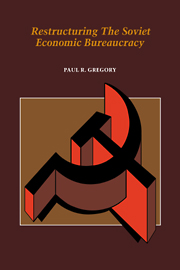2 - Design
Published online by Cambridge University Press: 24 March 2010
Summary
Theory of socialist bureaucracy
Organization theory provides a general framework for studying the way bureaucratic organizations work. The nature of organizations is defined by the individuals that staff them, by their formal and informal structures, by interactions among constituent parts, and by procedures for determining status and roles within the organization. Communications systems link the components of the organization and determine how information flows within the organization. Members of the organization make decisions, which depend on jobs, individual expectations, motivations, and the organization's structure. Organizations are composed of people and institutions. The classical organization theory of Frederick W. Taylor, James Rooney, and Alan Reiley focused on the anatomy of formal organization. Modern organization theory combines formal hierarchies with informal organization, human motivations, and information.
Organization theory, although general in focus, has been applied primarily to business organization, seldom to bureaucracy. Bureaucracy theory, like organization theory in general, has evolved in the direction of greater emphasis on human motivation and information flows. Max Weber, the most prominent student of bureaucracy, portrayed the bureaucrat as a professional dispassionately following welldefined orders. Weber saw no reason for the interests of bureaucrats to diverge from those of their superiors. The Weberian bureaucrat had no room for discretionary action; any two competent Weberian bureaucrats would carry out a given set of orders in exactly the same fashion. Accurate information would be volunteered at all levels of the bureaucracy.
- Type
- Chapter
- Information
- Restructuring the Soviet Economic Bureaucracy , pp. 13 - 24Publisher: Cambridge University PressPrint publication year: 1990

